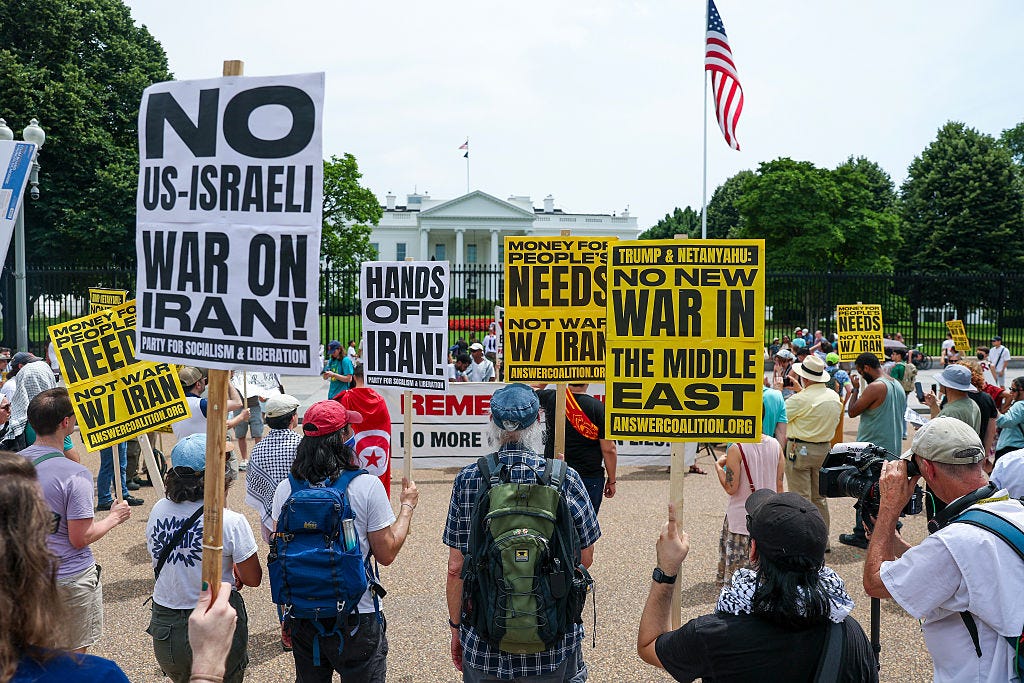What is the war in Iran for?
We try to make some sense of the unfolding situation as the U.S. enters the Israel-Iran conflict
As of Monday evening, Iran and Israel have reportedly agreed to a ceasefire; there has been no official confirmation by either government, though Donald Trump posted that the agreement would go into effect in stages beginning Monday night. We will continue to monitor the agreement as it develops.
Early on June 22, the U.S. entered the recent Israel-Iran war, bombing three of Iran’s nuclear energy facilities at Fordo, Natanz, and Isfahan, and quickly declaring that the country’s nascent nuclear weapons capability had been eliminated, or set back considerably. Israeli and U.S. officials had argued that the bombings were not meant to open a wider war, but were aimed solely at eliminating Iran as a nuclear threat.
After the weekend’s show of force, however, it now appears that nobody knows where the country’s stockpile of enriched nuclear fuel is, or if it was even on-site at the Fordo uranium enrichment plant. As international security scholar Jeffrey Lewis has pointed out, the current rounds of bombing may have missed the mark, and had not targeted the newest Iranian facilities on the International Atomic Energy Agency’s inspection agenda (but more on the Iran nuclear deal down the page).
With the job not done, what happens next is unclear. The White House and senior U.S. military officials are apparently divided on the rationale for the attack and even disagree as to whether the mission was meant as a single action to support the new round of warfare Israel began on June 12 or the first salvo in a broader American campaign aimed at destabilizing or replacing the Iranian government.
Iran responded militarily this afternoon, firing missiles at Al Udeid Air Base in Qatar, the headquarters of U.S. Central Command in the Middle East. The strike was limited in scale, and no injuries were reported. Meanwhile, Iran’s parliament has threatened to close the Strait of Hormuz to oil shipments, which could dramatically impact oil prices; the U.S. has called on another adversary — China — to dissuade Iran from making good on the threat.
Meanwhile, at home, despite all of the confusion, there is widespread agreement on one point: According to YouGov polling on Sunday, an overwhelming 85 percent of Americans say that they do not want America to be at war with Iran.
That’s the situation as it stands — but what does it mean, and where does it go from here? Read on for our rundown of what’s happening in the developing Middle East conflict.
How did the U.S. get involved in what seems like a war? Weren’t talks in progress?
The American bombings this weekend took many observers by surprise, since U.S. negotiations with Iran had been in process. Furthering the confusion, after Israel’s bombing campaign and Iran’s rocket counterattack, Donald Trump had earlier in the week announced a two-week window for negotiations before the U.S. would consider action.
Even given Trump’s by-now habitual use of a “two-week” interval as a stalling tactic, most analysts considered it a reasonable policy gesture, bolstered by the fact that as of last week, the U.S. intelligence community did not consider Iran’s program an imminent security threat. Judd Legum at Popular Information puts the timeline together — and makes the case that the rejection of intelligence in favor of top-down decisionmaking recalls George W. Bush’s case building for the invasion of Iraq:
Last Tuesday, asked about Gabbard's testimony on Iran, Trump said, "I don't care what she said." On Friday, as his rhetoric became more bellicose, Trump was reminded of that March assessment and asked: "What intelligence do you have that Iran is building a nuclear weapon?" Trump did not say that the intelligence community had gathered new information since March. Rather, Trump said that "my intelligence community is wrong." He also publicly rebuked Gabbard again, adding, "She's wrong."
Now, to justify the bombing of several sites in Iran, top members of the Trump administration claim Iran is actively pursuing a nuclear weapon. Appearing on Meet the Press on Sunday morning, Vice President JD Vance said that the administration believed "the Iranians were rushing toward a nuclear weapons program." That directly contradicts the March assessment by the IC that no such program had been authorized, much less commenced.
It turns out that the pause may have been meant only to buy time for the American bombing campaign, Trump already having been convinced by Israeli arguments that the Iranian nuclear program needed to be disrupted and only the U.S. had the equipment necessary to do it.
Why is this happening — wasn’t there a deal to prevent this?
The charge against Iran is that they were refining uranium at a purity level and scale out of line with what was allowed under the 2015 nuclear deal, or at least at a level unacceptable to the U.S. and Israel. The end of that deal (at least so far as the U.S. is concerned) is the source of what’s happening right now, but there is plenty of important historical background to be aware of beyond that. We’ll go back a few years to explain.




